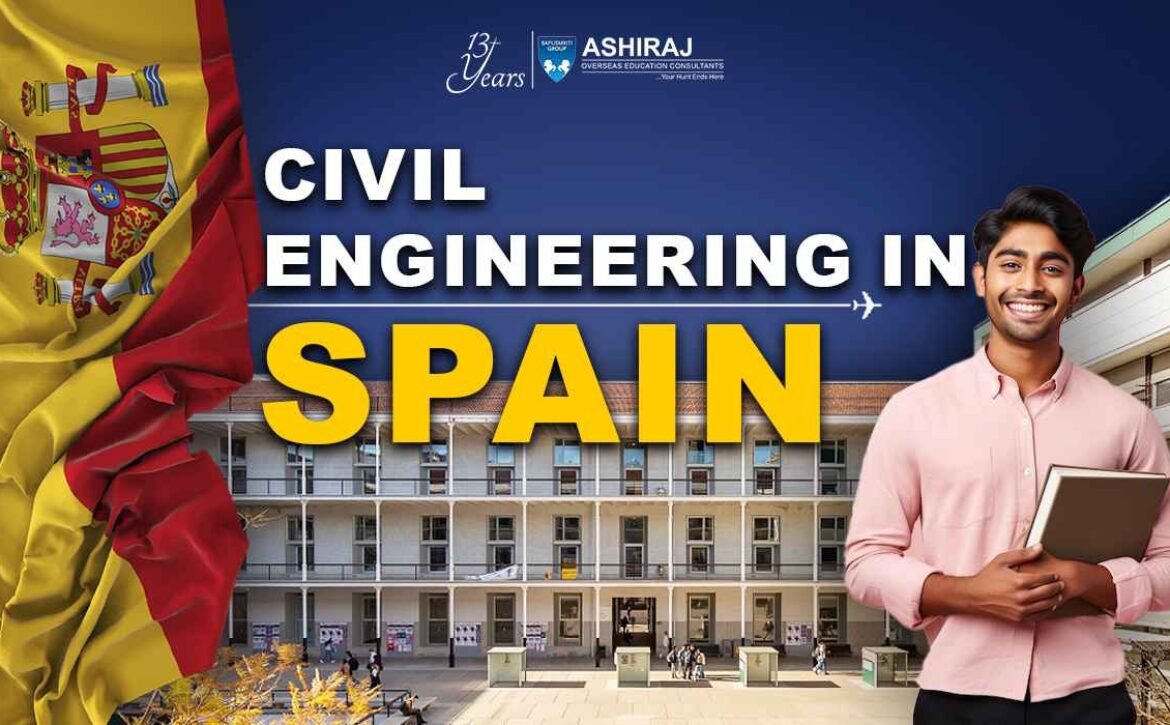
Civil Engineering in Spain
Civil Engineering in Spain offers an exciting opportunity for students to engage with cutting-edge infrastructure projects and a rich architectural heritage. With its blend of historic landmarks and modern constructions, Spain presents a unique setting for studying civil engineering. Universities in Spain are renowned for their rigorous academic programs and strong industry connections, providing students with the skills needed to excel in various civil engineering disciplines. The country’s commitment to innovation and sustainability in construction makes it an ideal place to learn about the latest engineering technologies and practices.
Studying Civil Engineering in Spain not only provides academic excellence but also the chance to immerse oneself in a vibrant cultural landscape. The educational institutions offer programs that emphasize practical experience, often through partnerships with leading companies and institutions. This hands-on approach ensures that graduates are well-prepared for the global job market, equipped with both theoretical knowledge and practical skills relevant to Civil Engineering in Spain.
Why to Study Civil Engineering in Spain?
- High-Quality Education: Universities in Spain offer top-notch education in civil engineering, combining theoretical knowledge with practical skills. The curriculum is designed to meet international standards, preparing students for a successful career in Civil Engineering in Spain.
- Innovative Infrastructure Projects: Spain is known for its impressive infrastructure projects, including bridges, highways, and buildings. Studying Civil Engineering in Spain allows students to learn from these real-world examples and gain insights into innovative construction techniques.
- Cultural Experience: Spain’s rich cultural heritage provides a unique learning environment. Students can experience a blend of historical and modern architectural styles, enhancing their understanding of civil engineering in diverse contexts.
- Research Opportunities: Spanish universities offer extensive research opportunities in civil engineering, focusing on sustainability, earthquake engineering, and smart construction technologies. This enables students to contribute to cutting-edge advancements in the field.
- Industry Connections: Spain’s strong network of construction companies and engineering firms offers valuable internship and job opportunities. Studying Civil Engineering in Spain provides access to these connections, facilitating career development and practical experience.
- Affordable Education: Compared to other Western countries, Spain offers relatively affordable education and living costs, making it an attractive destination for studying Civil Engineering in Spain.
- Language Skills: Studying in Spain provides the opportunity to learn or improve Spanish, a valuable skill in the global job market, especially in international civil engineering projects.
Top Universities to Study Civil Engineering in Spain
University | QS World University Ranking 2023 | Type of University | Average Annual Fees (in EUR) | Programs Offered |
1. Universidad Politécnica de Madrid (UPM) | 150-200 | Public | 1,000 | Bachelor’s and Master’s in Civil Engineering |
2. Universitat Politècnica de Catalunya (UPC) | 150-200 | Public | 1,200 | Bachelor’s and Master’s in Civil Engineering |
3. Universidad de Granada | 400-500 | Public | 800 | Bachelor’s and Master’s in Civil Engineering |
4. Universidad de Sevilla | 500-600 | Public | 1,000 | Bachelor’s and Master’s in Civil Engineering |
5. Universidad Carlos III de Madrid (UC3M) | 400-500 | Public | 1,500 | Bachelor’s and Master’s in Civil Engineering |
This table highlights the top universities for Civil Engineering in Spain, showcasing their rankings, type, fees, and the programs they offer. These institutions are recognized for their excellence in Civil Engineering in Spain and provide comprehensive educational opportunities in this field.
Course Curriculum for Civil Engineering in Spain
- Fundamentals of Civil Engineering: The curriculum begins with core subjects such as mathematics, physics, and basic engineering principles. These foundational courses are crucial for understanding complex topics in Civil Engineering in Spain.
- Structural Analysis: Students study the analysis and design of structures including buildings, bridges, and dams. This includes learning about load distribution, stress analysis, and material properties essential for Civil Engineering in Spain.
- Geotechnical Engineering: This segment covers soil mechanics and foundation design, teaching students how to assess soil properties and design foundations that support various structures in Civil Engineering in Spain.
- Construction Management: Courses in construction management focus on project planning, cost estimation, and construction methods. Students gain skills in managing construction projects and teams, which is vital for Civil Engineering in Spain.
- Environmental Engineering: Emphasizing sustainability, this part of the curriculum addresses water treatment, waste management, and environmental impact assessment. It prepares students to tackle environmental challenges within Civil Engineering in Spain.
- Structural Design Software: Practical training in modern design software tools used for structural analysis and simulation is included, enhancing students’ technical skills for Civil Engineering in Spain.
- Final Year Project/Thesis: A significant research project or thesis allows students to apply their knowledge to real-world problems, demonstrating their expertise in Civil Engineering in Spain.
Eligibility Criteria & Admission Requirements for MS in Civil Engineering in Spain
- Academic Qualifications: Applicants must have completed a high school diploma or equivalent, with strong grades in mathematics and science subjects. A relevant undergraduate degree is required for master’s programs in Civil Engineering in Spain.
- Language Proficiency: Non-Spanish speakers must demonstrate proficiency in English or Spanish. This typically requires standardized test scores:
Test | Minimum Score |
IELTS | 6.0 |
TOEFL | 80 |
GRE | 300 |
GMAT | 550 |
- Passport & Student Visa: International students must provide a valid passport and obtain a student visa to study Civil Engineering in Spain. The visa application requires proof of acceptance into a recognized institution.
- Academic Certificates: Submission of academic transcripts and certificates from previous institutions is required to demonstrate eligibility for the program.
- Work Experience: For master’s programs, relevant work experience in civil engineering or a related field may be required or preferred. This experience helps in understanding the practical aspects of Civil Engineering in Spain.
- Application Form: Complete the university’s application form with all required documents, including proof of language proficiency, academic certificates, and evidence of work experience if applicable.
Documents Required for Studying Civil Engineering in Spain
- Passport: A valid passport is essential for international students applying for Civil Engineering in Spain. It serves as proof of identity and nationality.
- Letter of Recommendation (LOR): Two letters of recommendation are typically required. These should be from academic or professional referees who can attest to the applicant’s suitability for the Civil Engineering program in Spain.
- Statement of Purpose (SOP): A well-written SOP outlining the applicant’s motivation, academic background, and career goals is crucial. It should highlight why they are interested in studying Civil Engineering in Spain.
- Curriculum Vitae (CV): A current CV detailing educational background, relevant skills, and any work experience should be submitted. This helps to provide a comprehensive view of the applicant’s qualifications.
- Official High School Transcripts: Transcripts from previous educational institutions are required to assess academic performance and eligibility for the Civil Engineering program in Spain.
- Certificates: Relevant certificates, including those for language proficiency and previous courses, must be provided to support the application.
- Work Experience Certificate: For some programs, a certificate of relevant work experience in Civil Engineering or a related field may be needed.
- Proof of Financial Resources: Evidence of financial resources, such as bank statements or financial guarantees, is necessary to demonstrate the ability to cover tuition fees and living expenses while studying Civil Engineering in Spain.
Admission Process for Civil Engineering in Spain
- Research Programs: Research universities and their Civil Engineering programs in Spain. Consider factors such as program structure, specializations, and university rankings.
- Prepare Documents: Gather all necessary documents, including your passport, official transcripts, letters of recommendation (LOR), statement of purpose (SOP), CV, and proof of financial resources.
- Language Proficiency: Ensure you meet the language requirements for Civil Engineering in Spain. This may involve taking English or Spanish language proficiency tests like IELTS, TOEFL, or their equivalents.
- Submit Application: Complete and submit the online application form for the chosen university. Make sure to include all required documents and pay any application fees.
- Application Review: Once submitted, the university will review your application and documents. They may request additional information or interviews as part of the evaluation process.
- Receive Admission Offer: If accepted, you will receive an admission offer letter. Review the offer and follow the instructions to confirm your acceptance.
- Apply for a Student Visa: After confirming your admission, apply for a student visa for Spain. Submit your visa application along with the admission letter and other required documents.
- Enroll and Register: Once in Spain, complete the enrollment process at your university. Attend orientation and register for your courses in Civil Engineering in Spain.
- Prepare for Studies: Organize accommodation and prepare for your studies, ensuring you are ready to start your Civil Engineering program in Spain.
“Education is the most powerful weapon which you can use to change the world.”
Nelson Mandela
Cost of Civil Engineering Course in Spain
- Tuition Fees: The average annual tuition fees for Civil Engineering in Spain range from €800 to €1,500 for undergraduate programs. Master’s programs may cost between €1,000 and €2,000 annually, depending on the university.
- Accommodation: Rent for student housing or shared apartments typically ranges from €300 to €700 per month. Costs can vary based on location and type of accommodation.
- Living Expenses: Monthly living expenses, including food, transportation, and utilities, average around €300 to €500. This depends on personal lifestyle and spending habits.
- Health Insurance: Health insurance is mandatory for international students. The cost is generally between €100 and €200 per year.
- Books and Materials: Expect to spend around €100 to €200 per year on textbooks and other study materials for Civil Engineering in Spain.
- Student Visa Fees: Applying for a student visa may incur a fee of approximately €60 to €100.
- Additional Costs: Other expenses, such as travel, social activities, and personal items, should also be considered. Budget around €200 to €300 per month for these.
Overall, studying Civil Engineering in Spain offers a cost-effective option compared to many other countries, while providing high-quality education.
Scholarships for Civil Engineering Courses in Spain
Scholarship | Amount | Application Deadline | Description |
La Caixa Foundation Scholarships | Up to €10,000 | June 15 annually | Offers financial support for tuition and living expenses for Civil Engineering in Spain. |
Spanish Government Scholarships | Up to €5,000 | July 31 annually | Provides funding for international students pursuing Civil Engineering in Spain. |
Erasmus+ Program | Varies by project | April 30 annually | Supports EU and non-EU students studying Civil Engineering in Spain with mobility grants. |
Universidad Politécnica de Madrid (UPM) Scholarships | €2,000 – €5,000 | May 31 annually | Available for outstanding students in Civil Engineering at UPM. |
Fundación Ramón Areces Scholarships | €6,000 – €8,000 | March 15 annually | Grants for research and study in Civil Engineering in Spain. |
These scholarships aim to support students in pursuing Civil Engineering in Spain, covering various aspects such as tuition fees and living expenses. Ensure to check specific eligibility criteria and application procedures for each scholarship.
Career Opportunities After Civil Engineering in Spain
Job Profile | Average Salary (Annual) | Description |
Structural Engineer | €30,000 – €45,000 | Designs and analyzes building structures, ensuring safety and stability. |
Civil Project Manager | €40,000 – €60,000 | Oversees construction projects, manages budgets, and coordinates with teams. |
Geotechnical Engineer | €35,000 – €50,000 | Focuses on soil and foundation engineering, assessing ground conditions for construction. |
Construction Site Engineer | €30,000 – €40,000 | Manages on-site construction activities, ensuring compliance with plans and safety standards. |
Urban Planner | €35,000 – €55,000 | Develops plans and policies for land use, infrastructure, and community development. |
Graduates of Civil Engineering in Spain have diverse career opportunities across various sectors. These roles involve working on infrastructure projects, managing construction activities, and contributing to urban development. The average salaries reflect competitive compensation for professionals in the field, with opportunities for career growth and advancement in Spain’s dynamic engineering sector.
Frequently Asked Questions About Civil Engineering in Spain
Some of the top universities include the Universidad Politécnica de Madrid, Universitat Politècnica de Catalunya, Universidad de Granada, Universidad de Sevilla, and Universidad Carlos III de Madrid.
Admission typically requires a high school diploma or equivalent, proof of language proficiency (IELTS/TOEFL for English or DELE for Spanish), academic transcripts, letters of recommendation, a statement of purpose, and a valid passport.
Tuition fees range from €800 to €1,500 annually for undergraduate programs, and €1,000 to €2,000 for master’s programs. Additional costs include accommodation, living expenses, and health insurance.
Yes, scholarships such as those offered by the La Caixa Foundation, the Spanish Government, the Erasmus+ Program, and various universities are available for students pursuing Civil Engineering in Spain.
Undergraduate programs typically take 4 years to complete, while master’s programs usually take 1 to 2 years.
Programs are generally offered in Spanish or English. International students should check specific language requirements for each university.
Graduates can pursue careers as structural engineers, civil project managers, geotechnical engineers, construction site engineers, and urban planners, among other roles.
Yes, international students can work part-time during their studies, but they must comply with visa regulations and university policies.
The process involves researching universities, preparing required documents, submitting applications online, and applying for a student visa after receiving an admission offer.
Non-Spanish speakers usually need to provide English proficiency test scores (IELTS/TOEFL) or Spanish language test scores (DELE) depending on the language of instruction of the program.




